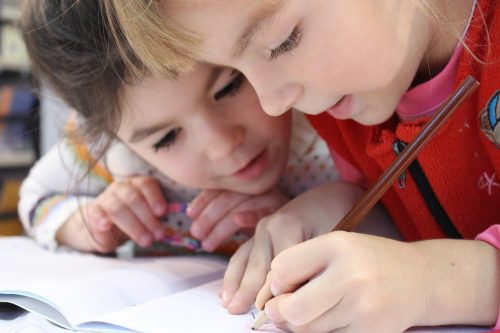Helping your child to prepare for writing is about more than just making sure they can write before they start school.

A common mistake many parents make, especially first time ones, is to compare their child to other children. I’m as guilty of this as any one, as I didn’t know what to expect of my eldest. Whereas some of her friends could write before they even started school, she could barely write her name.
I realised, much later, that this didn’t matter at all, in fact, schools actually prefer if they can teach children to write from scratch – a blank canvas, if you like – as it avoids having to undo bad habits.
The only pressure I did face with my children, was when my third child hadn’t actually decided which hand to use before he started school. He is predominantly left handed, but can do a lot with his right. At the time, he was showing delayed motor skills and was diagnosed hyper-mobile. Being very bendy has its advantages, right? But it does make controlling muscles more difficult, and as such, my son hadn’t developed enough strength in his arms to highlight a dominant side.
What was crucially important to my son, was to develop core strength, shoulder strength and fine motor movement in his fingers. This can all happen without even putting pencil to paper and without having these things in place, meant that writing and sitting at a desk would have been difficult for him.
Although my son may be considered an extreme case, this is not as uncommon as you think. Many of the children I see at my creative writing club, Storymakers, struggle with writing due to physical difficulties. There is nothing wrong with these children, per se, but some seem to lack the core strength to sit up properly and others struggle with pencil grip issues that mean they easily tire.
The best thing you can do to help your child prepare for writing is, in my opinion, to focus on what they need to put in place before they even get to the pencil holding stage.
One of the reasons attributed to my son’s issues was the fact he was the youngest of three and I had inadvertently done everything for him. Rushing around every morning to get the girls to school meant no time to let my son feed himself, get dressed, or basically do anything independently. We didn’t have time for that! He spent the majority of his time being shoved in and out of a car seat, or in the push chair and being a lazy boy, he was happy to let me do everything for him. But imagine how terrible I felt on hearing that it was basically my fault?
We have worked really hard with our son in terms of physio and exercises, plus lots of extra hand-writing practice, which he needed by this point, as he was in Year 3 and still couldn’t write in cursive. He’s now fine, but we notice, if he doesn’t keep up with the exercises, he begins to lose strength. That’s the hyper-mobility for you.
I have written previously about some of the exercises you can do to help your child with core strength and motor control.
At Storymakers, I will be running a new group from September 2019, aimed specifically at children in Reception and Year 1.
We won’t be focusing on phonics and letter formation, but instead, making sure the children have the skills in place to aid them with writing. Let’s think of it as avoiding bad habits and ensuring they enjoy writing, which is always my aim.
In this group, we will also begin to look at what makes a story, from the understanding of structure, to the role of characters and settings. I’m not expecting paragraph upon paragraph of writing, but would like to facilitate the process of writing, to help get children started on their journey to becoming story makers of their own.
The Preparing for Writing Group will run every Saturday, 1 p.m. to 2 p.m. at the Storymakers Studio in Sevenoaks (term time only), starting 7th September.
Booking is via the website.

0 Comments